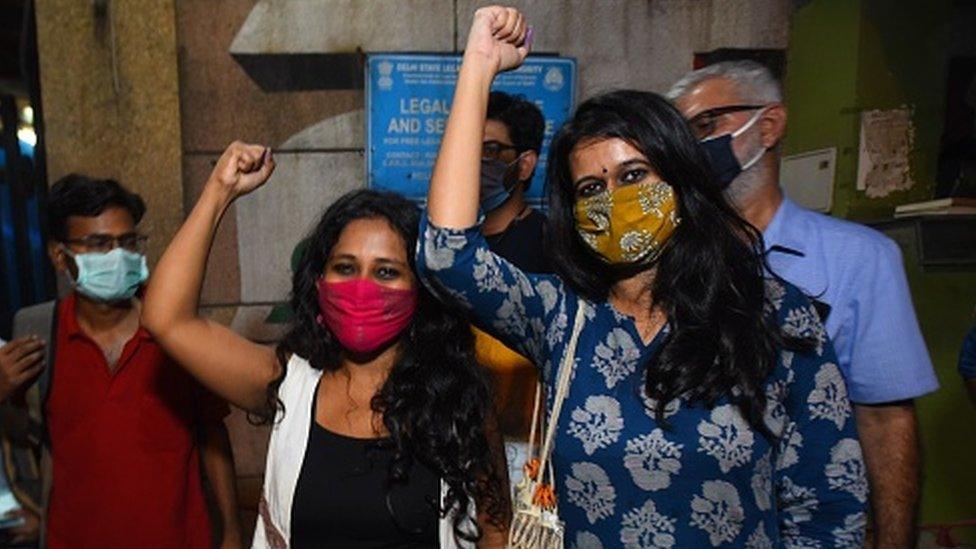Sudha Bharadwaj: The prison life of India's best-known woman activist
- Published
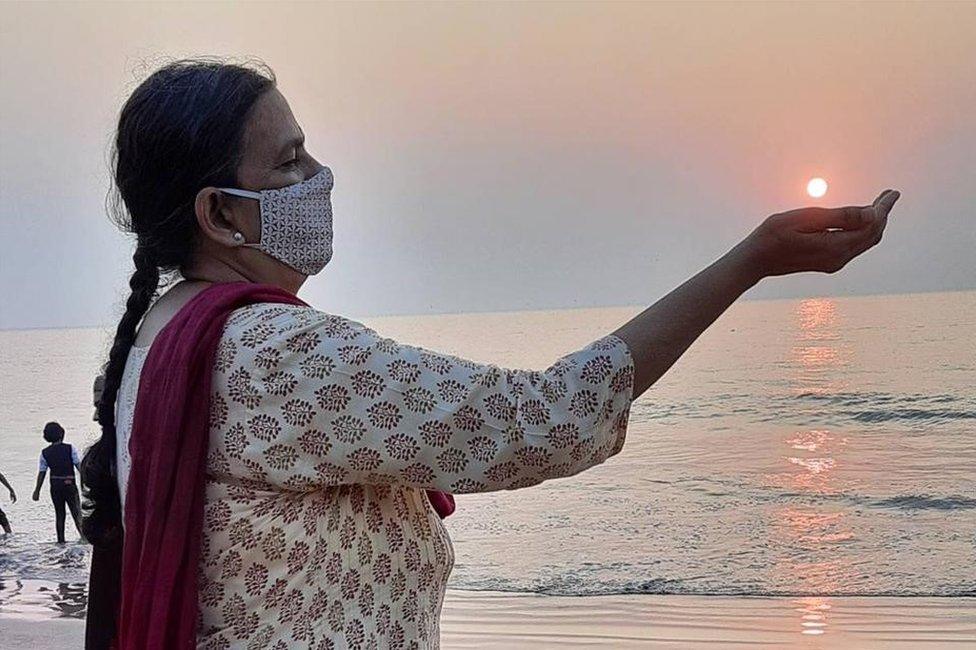
Sudha Bharadwaj cannot leave the city of Mumbai until her trial ends
After three years in prison, one of India's best-known activists is trying to set up home in a new city and find work.
Bail conditions prohibit Sudha Bharadwaj from leaving Mumbai until the end of a trial in which she is accused of a role in a 2018 incident of caste-based violence and alleged links with Maoists. She is also not allowed to talk about the case.
Since June 2018, Prime Minister Narendra Modi's BJP government has jailed 16 people in connection with the violence in Bhima Koregaon village in Maharashtra state. They include some of India's most respected scholars, lawyers, academics, activists and an ageing radical poet. (Tribal rights activist, Stan Swamy, died last year in hospital, aged 84.) They have all been repeatedly denied bail under a sweeping anti-terror law, which many observers believe is now being mainly used to crack down on dissent.
Ms Bharadwaj cannot return to her work as a professor of law at a leading university in the national capital, Delhi, or go home to Faridabad on the outskirts. She is unable to visit her daughter who's studying psychology in Bhilai, more than 1,000km (620 miles) away. (The two were reunited briefly after she was freed on 10 December.)
"From a smaller jail I am now living in a bigger jail, which is Mumbai," Sudha Bharadwaj, 60, told me on Monday in her first interview since being released.
"I have to find work, and a place I can afford," she said. Until then she is staying with a friend.
Born in Massachusetts, Ms Bharadwaj gave up her American passport after her parents returned to India. The mathematician-turned-lawyer would eventually become a committed activist and trade unionist steadfastly fighting for the rights of the dispossessed in the mineral-rich state of Chhattisgarh, where some of India's poorest and most exploited live.
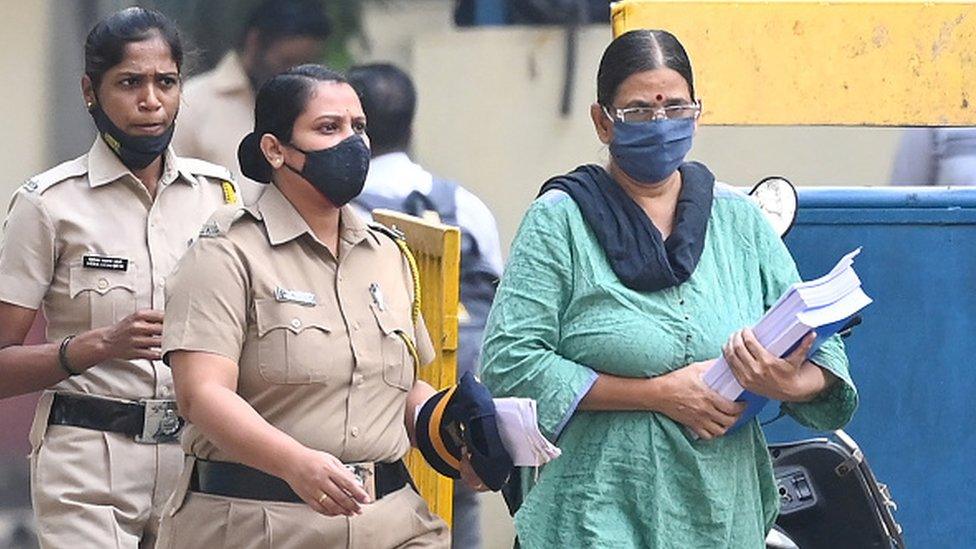
Ms Bharadwaj was released in December after three years in prison
But it was her three-decade-long work providing legal aid to the poor that made her a shining beacon of hope for many in the fight for justice.
Yet, she says her time in prison, especially during the pandemic, was an eye-opener.
"Jail conditions are no longer medieval. But the loss of dignity that you suffer the moment you go in comes as a shock," she said.
Ms Bharadwaj was arrested on 28 October 2018 and her phone, laptops and some CDs taken away. She was denied bail on three occasions and spent time in two prisons before she was freed.
She spent half of that time at Pune's high-security Yerwada Central Jail, which largely houses convicted offenders, in a block of cells once reserved for death row prisoners.
A long corridor ran alongside the cells, where she could take walks in the morning and evening. But prisoners were allowed into the open yard overlooking the cell only for half an hour every day. Frequent water shortages meant that they had to carry buckets of water to the cell to bathe and drink.
Meals were made up of dal, two pieces of roti and vegetables. Inmates who could afford it could buy extra food from the jail canteen - their families were allowed to deposit a maximum of 4,500 rupees ($60) every month into their jail accounts. They rolled incense sticks, made mats and grew vegetables and paddy in a prison farm to earn some money.
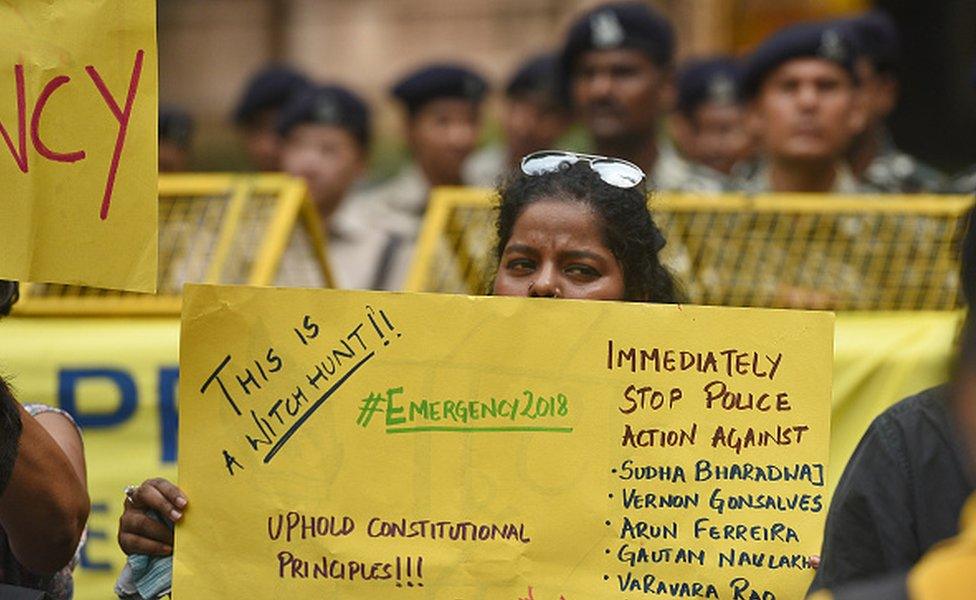
There have been protests in India against the arrests of human rights activists
Byculla jail in Mumbai, where she was later shifted, was busier and more chaotic because of a high population of inmates awaiting trial. At some point, there were 75 inmates in her unit in the women's wing, originally built to accommodate 35, and they slept next to each other on the floor on a mat. Each was allotted a space the "size of a coffin", Ms Bharadwaj said.
"Overcrowding becomes a source of fights and tensions. There's a queue for everything - food, toilets."
Thirteen of the 55 women in her unit were infected with Covid-19 during a brutal second wave of the pandemic last summer. Ms Bharadwaj says she was sent to the jail hospital and then to a congested "quarantine barrack" after running a fever and having diarrhoea.
"The judiciary should consider decongesting our jails more seriously. Even during the pandemic most people did not get interim bail [bail granted for a brief period of time] to return to their families."
India's 1,306 prisons house some 490,000 inmates, 69% of them waiting for their trials to begin. Average occupancy rates can climb to 118%. In 2020, the Supreme Court asked states to free inmates at notoriously overcrowded prisons to prevent the spread of Covid-19.
In Byculla prison, Ms Bharadwaj spent a lot of her time writing dozens of legal aid applications for fellow women inmates seeking interim bail - many suffering from TB, HIV, asthma and others who were pregnant. "None of them got it, in part because there was nobody to argue for bail in the courts."
Most fellow inmates had been detained in cases of sex work, or trafficking in humans and drugs. Others were "wives, girlfriends and mothers" of fugitive gangsters, she says.
"The [second wave] was a really tough time for inmates. The courts had stopped work, family visits to prisoners were not allowed, the trials had come to a halt. It was a miserable time," Ms Bharadwaj recalled.
"The old and people suffering from co-morbidities must be given bail on personal bonds. Quarantining inside the already overcrowded jails makes no sense."
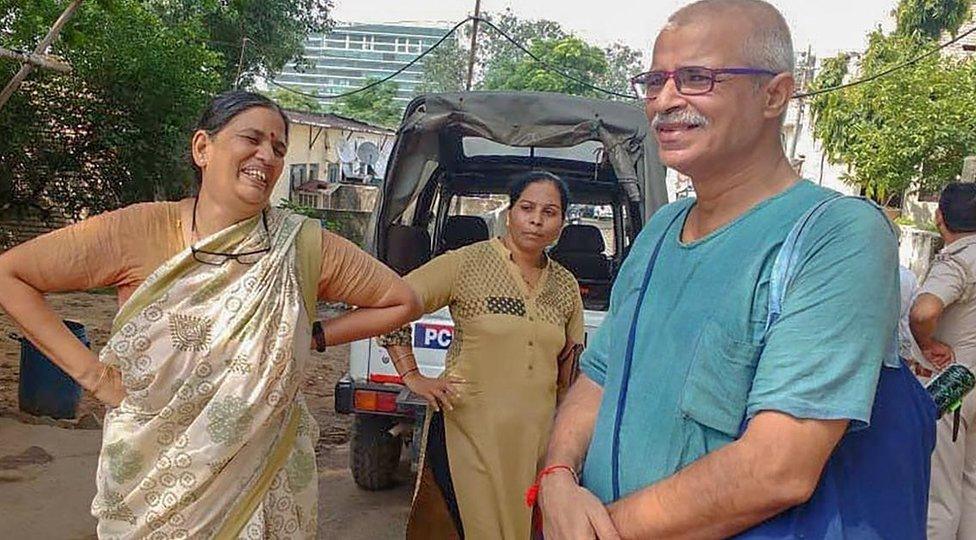
Sudha Bharadwaj (left) has worked with some of India's poorest people
Ms Bharadwaj said she was shocked by the shambolic state of legal aid for poor inmates on trial, who formed the bulk of the jail population.
"Many prisoners don't even know the names or have the phone numbers of their own lawyers until they meet them in court. The poorly paid lawyers don't even come to the prison to meet their clients. Prisoners feel there's no use in having a legal aid lawyer. And only a few can afford a private lawyer."
Ms Bharadwaj says she attended a meeting in the jail where she proposed that legal aid lawyers should visit once in three months, meet their clients and be paid properly.
"When you go to jail, you find so many people so much more miserable than you. I didn't find time to be miserable. I felt bad essentially because of separation from my daughter."
Ms Bharadwaj says she spent her time singing songs to children of women inmates, doing prison work, and reading "quite a lot", including books by Edward Snowden, William Dalrymple, and Naomi Klein. At the height of the pandemic, she found a well-thumbed copy of Albert Camus's The Plague in the prison library.
But one experience she will never forget is what happened when she heard the news that India would be locking down in March 2020 to to slow the spread of the coronavirus.
"Suddenly the jail was in ferment. Prisoners went on a hunger strike, skipping breakfast and lunch. They were saying, 'We don't want to die here. Let us go home and die there'."
They finally calmed down when the jail superintendent told them that nobody was really safe from the virus outside the prison either.
She said this showed how precarious their lives and existence were. "I have never seen the inmates more scared and wanting to be released."

The comedians under fire from Hindu nationalists

Related topics
- Published29 August 2016
- Published13 October 2020
- Published12 February 2014
- Published30 June 2021
